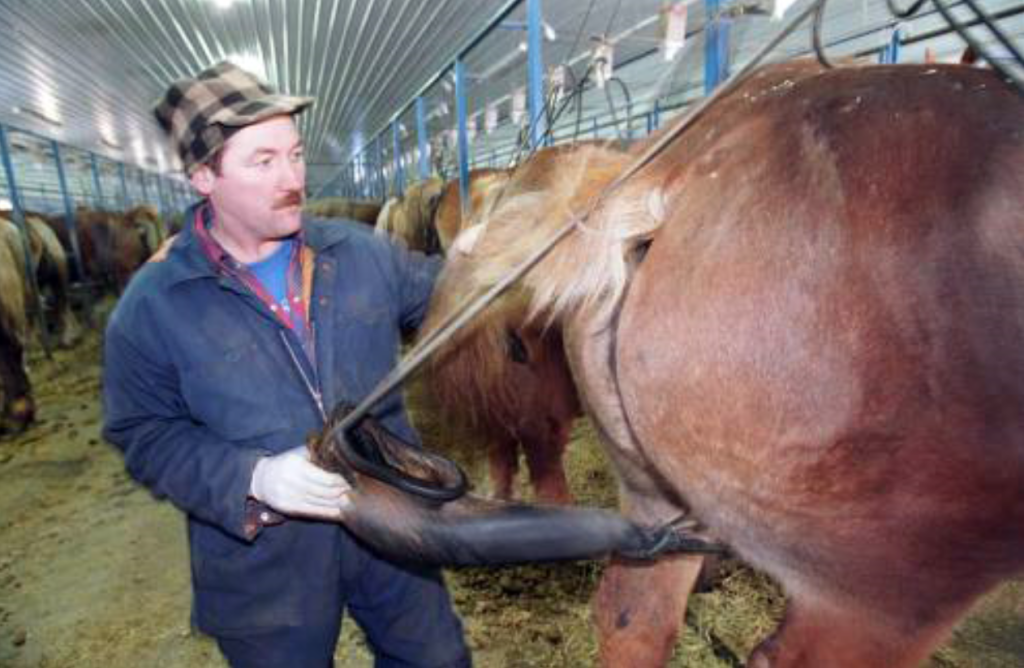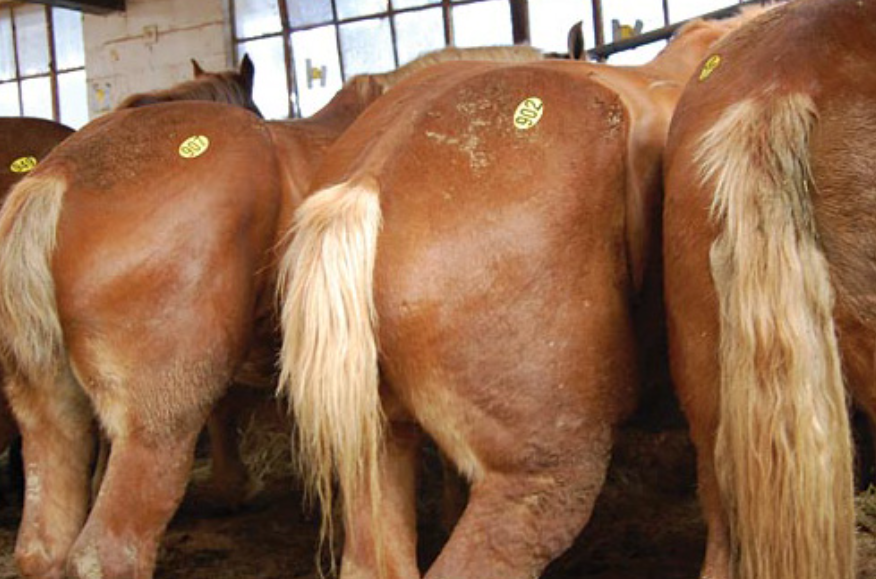“See, the foals — and the mares which can’t get pregnant any more — they are the byproduct of the PMU industry. … We crush ’em and recycle ’em, just like cans.” —Canadian Slaughterhouse Buyer

More information at the HorseFund.org –
The Mares
Premarin PMU mares are typically Belgian – Quarter Horses crosses. PMU stands for “pregnant mare urine,” which is the only function these mares are allowed to have. They are impregnated for the hormones that will be produced in their urine.
For most of their 11-month pregnancies, these horses are confined to stalls so small that they cannot turn around or take more than one step in any direction.
The animals must wear rubber urine-collection bags at all times, which causes chafing and lesions.
Once the foals are born, the horses are re-impregnated; this cycle continues for about 12 years.

PMU ranchers are only expected to follow the “Recommended Code of Practice for the Care and Handling of Horses in PMU Operations ”— a document produced by a “study committee” that included a Wyeth representative — on a voluntary basis.
The document states that horses may be allowed only “as much exercise as is necessary for their welfare,” leaving the exact amount open to interpretation.
When they are too old to breed, many are sent to slaughterhouses.

The Foals
The fate of the thousands of foals born on PMU farms each year is equally disturbing.
Some are used to replace their exhausted mothers.
Some are offered for adoption (although Big Pharma funded farms are not permitted to work directly with rescue organizations), but the remaining foals—along with worn-out mares—are sold at auction by farmers to make extra money, where most are purchased by middlemen working for slaughterhouses.
The Drugs
The most commonly known drug containing conjugated equine estrogen (CEE), derived from pregnant mare’s urine (PMU), is Premarin.
Premarin is currently manufactured by Wyeth, who merged in 2009 and now a division of pharmaceutical giant, Pfizer Inc.
Every year, doctors prescribe hormone replacement therapy (HRT) drugs — also referred to as menopausal hormone therapy (MHT) — to hundreds of thousands of women experiencing menopausal symptoms.
One of the most widely prescribed drugs for HRT is Premarin, dispensed in pill and cream form.
Not only has this form of HRT proved dangerous to humans, but also the horses kept confined, pregnant and milked for their urine.
So many of their foals, taken away once they are weaned or nearly weaned, often end their young lives in the slaughterhouse.
Risks to Women Outweigh Benefits of PMU Drugs
In 2002, the Women’s Health Initiative (WHI) study of more than 16,000 women using Prempro, was abruptly halted by the federal government after it concluded that HRT raises a woman’s risk of having a stroke by 41 percent, risk of suffering a heart attack by 29 percent, and risk of getting breast cancer by 26 percent.
Dr. Claude Lenfant—director of the National Heart, Lung, and Blood Institute, which sponsored the study—said the cardiovascular and cancer risks were “too high a price to pay” and urged women who want to ward off heart disease to “focus on well-proven treatments” instead, such as controlling blood cholesterol and keeping their weight down.
The WHI also found that Prempro has no meaningful effects on women’s physical or emotional health, pain levels, memory, sleeping patterns, or energy levels. The researchers concluded that Prempro is effective for short-term relief from hot flashes but nothing else.
Many women find that they can control hot flashes and other menopausal symptoms by making easy lifestyle changes—like eating a low-fat vegetarian diet and getting regular exercise—rather than contributing to animal suffering. Dr. Jennifer Hays from the Baylor College of Medicine commented, “The average woman will not experience an improvement in her quality of life by taking this pill.”
At the time of this writing, Wyeth (now a division of Pfizer) faces more than 5,000 personal injury lawsuits filed by more than 8,000 women who took Prempro or Premarin.
Premstoppers
PREMSTOPPERS is a Horse Fund campaign to eliminate the making of drugs with pregnant mare’s urine and its decades old legacy of cruelty and death.
Click here to learn about alternative to PMU drugs.
Click here to learn about what you can do to get involved.
More information at the HorseFund.org –
Feature image of PMU mare”Summer,” who was rescued by the Hooved Animal Rescue of Thurston County (HAR-TC).

I’m Melissa Genson CPA/CIA, investigative journalist and publisher of Quartzsite Star. I’m a Certified Public Accountant and Certified Internal Auditor, and I specialize in fraud and money laundering investigations. My husband Steve and I are also full-time RV nomads since 2018, traveling the U.S. with our little dog Oliver. Ride along with us!




